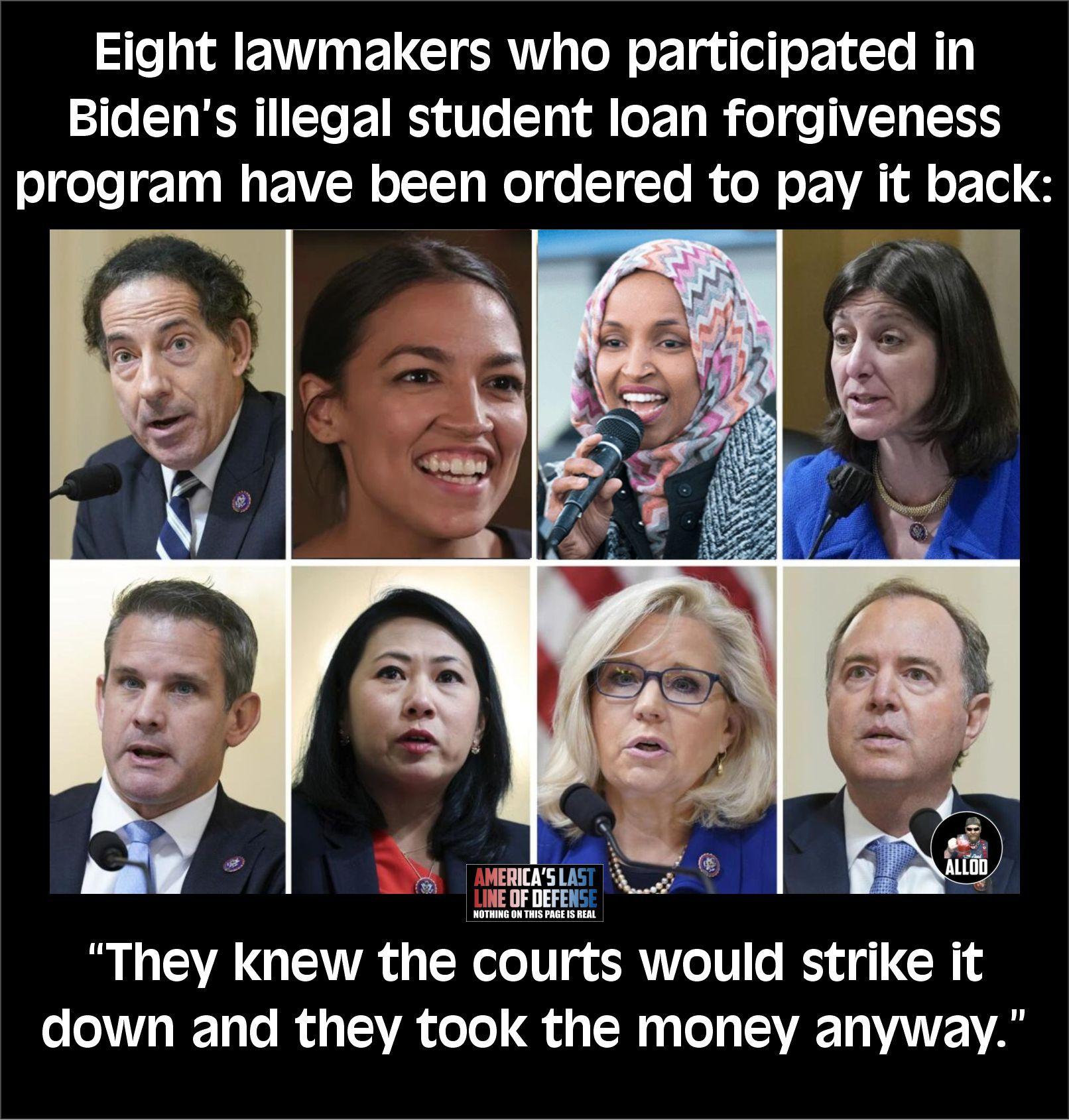In an age where politics, humor, and misinformation frequently overlap, one viral image has reignited debate about student loan forgiveness, government accountability, and the way Americans consume news. The meme in question, which has circulated widely on social media, claims that eight prominent lawmakers participated in President Biden’s “illegal” student loan forgiveness program and were ordered to pay the money back. Underneath, the image includes portraits of well-known figures such as Alexandria Ocasio-Cortez, Ilhan Omar, Adam Schiff, and Liz Cheney, followed by the caption: “They knew the courts would strike it down and they took the money anyway.”
To the casual viewer, it might look like breaking news. But the truth is more complicated—and far more revealing about how modern political messaging works.

The Origins of the Meme
This image originates from “America’s Last Line of Defense,” a satirical website and Facebook page known for publishing politically charged parody content. Their disclaimer explicitly says: “Nothing on this page is real.” Despite this, posts from the page often circulate without context, stripped of the satire label and repurposed as supposed “evidence” in political debates.
The meme leverages two powerful emotional triggers: frustration over student loan debt and distrust of elected officials. By suggesting that lawmakers personally benefited from a controversial forgiveness program, the meme taps into a common narrative—that politicians play by a different set of rules than ordinary Americans.
Why Student Loan Forgiveness Became a Flashpoint
President Biden’s student debt forgiveness plan has been one of the most polarizing policies of his administration. The initiative proposed canceling up to $20,000 in federal student loans for eligible borrowers. Supporters hailed it as long-overdue relief for working- and middle-class Americans burdened by debt, while critics argued it was unfair to taxpayers who either never attended college or had already paid off their loans.
The U.S. Supreme Court ultimately struck down the plan in June 2023, ruling that the administration had overstepped its authority. This decision left millions of borrowers in limbo and intensified partisan conflict over higher education financing.
It is precisely this contentious backdrop that makes the meme so effective as political commentary, even when it is not based in fact.
The Lawmakers Featured: Why Them?
The meme doesn’t choose its targets randomly. It includes progressive Democrats like Ocasio-Cortez and Omar, who have championed student debt cancellation, as well as Adam Schiff and Jamie Raskin, frequent conservative punching bags for their roles in impeachment proceedings. Interestingly, it also features Republicans Liz Cheney and Adam Kinzinger, both of whom broke with their party to criticize Donald Trump.
In other words, the image lumps together political figures from different backgrounds but with one commonality: they are often vilified in right-wing media. The point is not accuracy but emotional impact.
The Problem of Satire Without Labels
Satire has always been a part of political discourse. From Mark Twain to The Onion, humor has helped expose hypocrisy and challenge power. The difference today is the speed and reach of social media, where context often disappears.
When a parody image is shared on Facebook, Twitter, or Instagram without its original watermark or disclaimer, it can look indistinguishable from genuine reporting. In polarized communities where people are already primed to distrust politicians, many will accept it at face value.
A 2022 study from MIT found that misinformation spreads faster and farther than factual reporting online, largely because it is designed to provoke strong emotional reactions. Satirical content like this meme often walks the line between parody and propaganda.
What It Reveals About Public Trust
Whether people laugh at this meme, believe it, or angrily debunk it, its popularity says something important about American democracy: trust in institutions is fragile.
For many, the idea that lawmakers would exploit a public program for personal gain feels plausible—even if it isn’t true—because political scandals are so common. The mixing of real frustrations (student debt, government overreach, elite privilege) with fictional details creates a narrative that resonates on an emotional level, regardless of factual accuracy.
How to Navigate Viral Political Content
So, what should readers do when confronted with memes like this one?
-
Check the Source: Look for disclaimers or the origin of the image. If it comes from a satire page, that’s your first clue.
-
Verify with Reliable News Outlets: If a claim seems shocking, credible journalism will either confirm or debunk it quickly.
-
Consider Why It’s Effective: Even false memes reveal something real about public sentiment. Ask yourself: what frustration is this image tapping into?
-
Engage Critically, Not Cynically: Recognize the humor if intended, but don’t allow misinformation to harden distrust in democratic processes.
Conclusion: More Than Just a Joke
At first glance, the “eight lawmakers ordered to pay back student loans” meme is just another piece of political satire. But it illustrates something deeper about America in 2025: a society where fact, fiction, and frustration collide daily on our screens.
Student loan forgiveness remains a genuine policy battleground, with real consequences for millions of Americans. Yet, in the shadow of that debate, memes like this one serve as reminders of the growing gap between political theater and substantive discourse.
In the end, whether we laugh, scoff, or rage at such content, the responsibility falls on each of us to separate satire from reality—and to remember that democracy depends not only on free expression but also on informed citizens.





